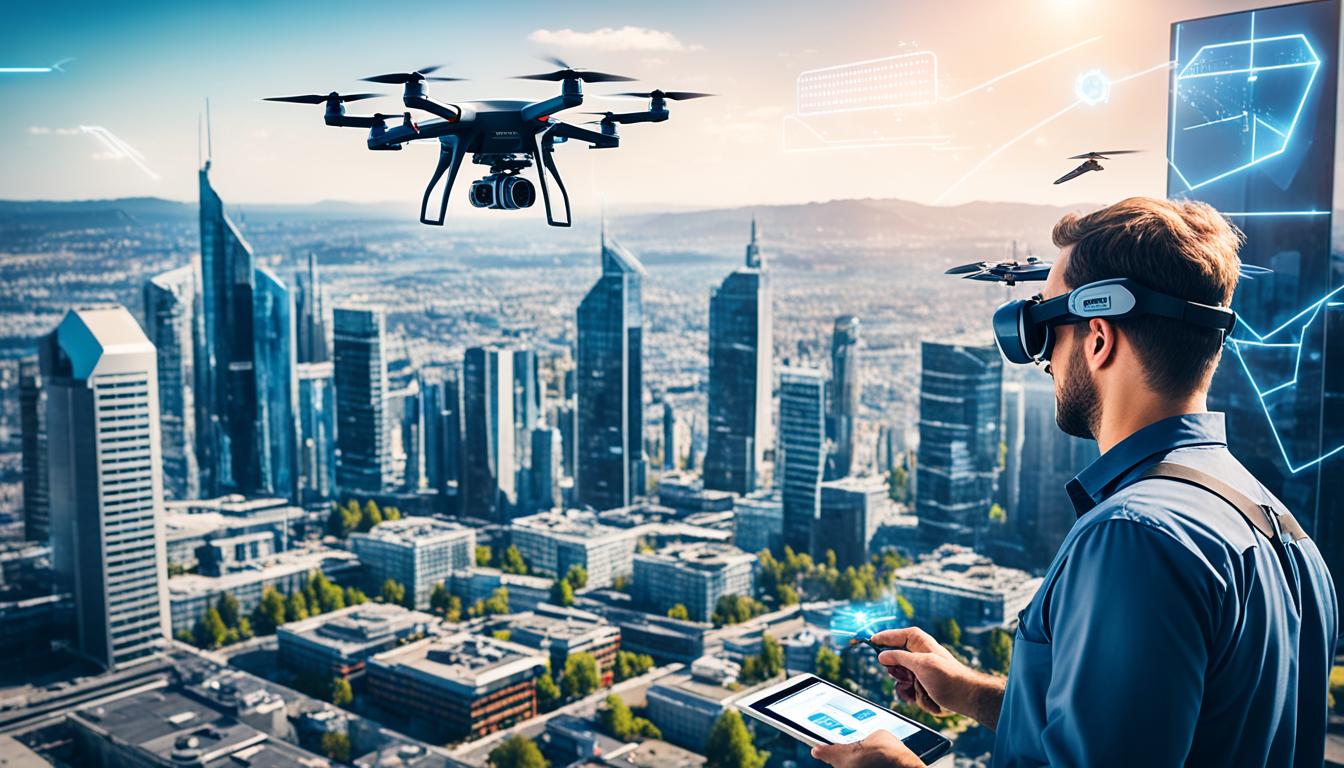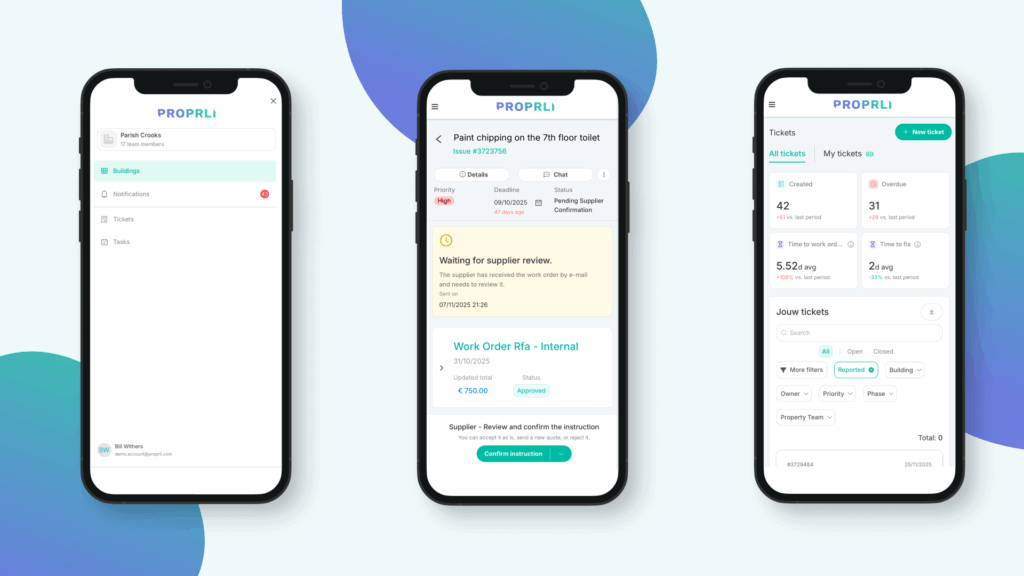As we move past the pandemic, 2024 is showcasing the continued importance of technology in the real estate industry’s recovery and stability. PropTech trends are at the forefront of this change. They focus heavily on integrating digital acceleration with a superior user experience. These advancements strive to support property managers and tenants effectively.
Recent years have seen financial stress. This has led to a significant move towards digital transformation in real estate. Now, the sector is finding its footing again, with PropTech playing a key role. While the market is leveling out, opportunity for tech growth is vast. PropTech is key in making operations smoother, pushing for sustainability, and improving property upkeep and management in today’s market.
Key Takeaways:
- Technology is central to post-pandemic recovery and stability in real estate.
- PropTech trends in 2024 focus on balancing digital acceleration with user experience.
- The financial pressures of previous years have driven a shift towards digital transformation.
- The real estate sector is stabilizing with an emphasis on PropTech innovation.
- PropTech is crucial for streamlining operations, improving sustainability, and enhancing property maintenance.
Introduction to PropTech Trends in 2024
The rapid evolution in emerging proptech is fundamentally altering the real estate experience, encompassing everything from property searches to acquisitions and management techniques. In 2024, we witness the maturation of property technology. Despite previous market volatility, digital tools within the real estate sector are increasingly adopted, showcasing a technological tipping point. This trend is democratizing investments, optimizing predictive analytics, fostering smart building development, and enhancing tenant engagement.
In the current landscape, the digital transformation in property sector represents a convergence of innovation and practical solutions. Several key drivers are at the forefront of this transformation. These include AI-powered predictive maintenance, which anticipates repair needs before they become critical, and personalized property searches that tailor results to individual preferences. The integration of big data strategies further streamlines operations, providing deeper insights and enhancing overall efficiency in property management.
Consensus within the industry suggests that Proptech 2024 overview focuses on the dual goals of optimizing performance and elevating user experiences. This transformative trend is set to significantly impact the real estate industry, making it an exciting era for property managers and investors alike. As the adoption of proptech continues to grow, its influence on every aspect of real estate—from leasing to maintenance—becomes increasingly pronounced.
| Key Trends | Impact |
|---|---|
| AI-Powered Predictive Maintenance | Reduces downtime and costs through early detection and proactive maintenance. |
| Personalized Property Searches | Enhances user experience by offering tailored search results. |
| Big Data Strategies | Increases operational efficiency and provides in-depth market insights. |
Artificial Intelligence in Real Estate Maintenance
Artificial Intelligence (AI) is revolutionizing the real estate maintenance sector. It does so mainly through predictive maintenance. This innovation lets property managers foresee necessary repairs. As a result, it minimizes downtime and cuts down on maintenance expenses.
The Role of AI in Predictive Maintenance
AI excels in predictive maintenance by analyzing complex data to predict possible problems. This enables property managers to avoid expensive repairs and unplanned outages. Real estate platforms utilize AI-driven predictive maintenance algorithms. These tools provide accurate property valuations and enhance underwriting methods, securing a competitive edge in the market.
Enhancing Tenant Experience with AI
AI considerably improves how tenants interact with services. Through AI-powered chatbots, tenants receive instant replies to their queries. This ensures maintenance requests are processed swiftly. Predictive algorithms also refine rental approaches and preemptively organize maintenance tasks. This reduces inconvenience for tenants, significantly boosting their satisfaction with the services.
Augmented Reality (AR) and Virtual Reality (VR) in Property Viewing
AR revolutionizes real estate tours by adding digital details to our real surroundings. Through mobile devices or AR glasses, people can imagine renovations or designs on properties. This feature is especially helpful for assessing undeveloped or renovation-needed properties.
In contrast, VR allows users to explore properties in depth from any location. With VR headsets, they can navigate through spaces as if they were physically present. This immersive method aids in understanding a property’s layout and feel without actual visitation.
Platforms like iStaging lead in providing realistic VR property experiences. They enable agents to showcase properties to global clients effectively through their screens. Integrating such technologies not only expands market reach but also makes the property transaction process smoother.
The progression of AR and VR in real estate continues to enhance the way properties are showcased and viewed. These innovations merge the physical with the digital, offering immersive experiences. They’re changing the landscape of property marketing and viewing significantly.
- AR in Real Estate: Enhances visualization of property potential
- VR Property Tours: Enables remote exploration of properties
- Immersive Property Viewing: Elevates client engagement and decision-making
Sustainability and Smart Buildings
The real estate landscape is transforming with a focus on sustainability. Smart buildings are at the forefront of this wave. They’re crafted to be leaders in environmental conservation by slashing energy use and costs. Through the lens of IoT and AI, we delve into how they’re revolutionizing property management for a sustainable tomorrow.
Energy Efficiency with IoT Devices
Iot devices play a pivotal role in making smart buildings energy efficient. Through smart meters and automated lights, they adjust based on real-time data, reducing unnecessary energy spend. These technologies also give managers actionable insights. This aids in crafting strategies to curtail energy consumption effectively.
AI for Sustainable Building Management
AI elevates sustainable building management to new heights. It sifts through vast data pools, identifying areas of waste and optimizing energy use. When used alongside IoT, AI enhances the ability of buildings to tap into renewable resources. This approach slashes operational costs, marking a leap towards sustainable real estate.
Real Estate Predictive Analytics Engines
In the ever-changing real estate market, predictive analytics engines are now critical. They use large datasets to provide insights. This helps professionals make smart decisions about property values and market trends.
The Importance of Predictive Analytics in Market Forecasting
Predictive analytics are pivotal for forecasting in real estate. They sift through trends and patterns. This allows professionals to foresee shifts in the market. Being ahead of these changes supports strategic planning and proactive actions. This is crucial for technical property and asset managers facing market complexities.
Using Predictive Analytics for Property Value Estimations
Predictive analytics engines significantly impact property value estimations. They consider historical data, present market conditions, and likely future trends. This method provides accurate valuations. It helps technical asset managers meet financial objectives and keeps property managers competitive.
| Benefits | Applications |
|---|---|
| Market Forecasting | Anticipate real estate trends and market shifts |
| Property Value Estimation | Provide accurate property valuations |
| Strategic Planning | Develop informed investment and business strategies |
Frictionless Rental Lifecycle Management
In 2024, the landscape of rental lifecycle management is revolutionized by AI. This technology offers a seamless journey for tenants and property managers alike. From rent collection to handling service requests, every aspect is refined for efficiency and automation.
The adoption of AI-driven solutions transforms property management. It reduces the need for manual work and smooths out operations. Rent collection and lease renewals are automated, guaranteeing prompt transactions without human errors.
Handling service requests is significantly improved. Tenants can easily report problems and follow their resolution, thanks to AI. This not only speeds up the process but also improves tenant satisfaction. It takes a load off property managers, making their job easier.
The following table highlights some key aspects of frictionless rental lifecycle management:
| Aspect | Traditional Method | AI-Enhanced Method |
|---|---|---|
| Rent Collection | Manual, prone to delays | Automated, timely payments |
| Lease Renewals | Requires manual review | Automated, seamless process |
| Service Requests | Manual reporting and tracking | AI-powered, efficient handling |
| Tenant Communication | Static, manual responses | AI-driven, dynamic interactions |
Integrating AI into rental lifecycle management reflects a deep commitment to improving property management. It not only elevates the tenant experience but also boosts the efficiency of property managers.
Digital Personalization in Property Searches
The landscape of property searches has transformed dramatically. Buyers now prefer experiences tailored to their unique tastes. With digital personalization, real estate platforms can recommend properties that perfectly match a user’s specifications. This not only makes the search process more efficient but also greatly improves user satisfaction.
Personalized Recommendations for Property Buyers
Artificial Intelligence is crucial in providing personalized property recommendations. It analyzes user data and behavior to suggest properties that meet buyers’ preferences and budget. This method of personalized searching creates a more rewarding property buying journey. It ensures potential buyers find properties that truly fit their needs.
Enhancing User Experience with Tailored Property Listings
Personalized content is key to improving user experience with property listings. It allows users to quickly find properties that meet their desires, saving time and reducing frustration. The adoption of data-driven personalization marks a new standard in the industry. It leads to a more intuitive and pleasant real estate search experience.
| Feature | Benefit |
|---|---|
| AI-Powered Recommendations | More accurate property matches |
| Personalized Listings | Enhanced user engagement |
| Data-Driven Search Filters | Time-saving and efficient |
| Customized User Experience | Higher satisfaction levels |
Smart Home Technology for Real Estate
Smart home technology is rapidly transforming the real estate landscape. It offers features that connect with today’s tech-savvy consumers. Gen-Z buyers are especially keen on homes that have automated lighting, smart locks, and energy-saving thermostats.
Integrating smart home technology into properties enhances both convenience and security. It also significantly increases property values. These innovations offer homeowners a connected, seamless living experience, unlike traditional amenities. The move towards automation and connectivity is changing market dynamics. It makes tech-enhanced homes more attractive to a wide audience.
Ecobee’s smart thermostats are particularly noteworthy among smart home devices. They provide energy savings and remote control capabilities, fitting modern lifestyles perfectly. The advantages are clear: these innovations attract tech-oriented buyers, cut down on energy expenses, and support sustainable living. As the interest in smart technology grows, homes with these features will stand out in the real estate market.
| Smart Home Feature | Benefit |
|---|---|
| Automated Lighting | Energy Efficiency and Convenience |
| Smart Locks | Enhanced Security |
| Smart Thermostats | Cost Savings and Remote Access |
Automation and Property Management Software
Property management automation is changing the game in real estate. It makes managing operations more efficient. With new software for real estate management, handling multiple tasks has become simpler for property managers.
Streamlining Operations with Automated Workflows
Software for real estate management now features automated workflows. These systems manage operations like lead tracking, follow-ups, and scheduling without much human input. As a result, response times drop and conversions increase.
Predictive Maintenance and Automated Tenant Portals
Artificial intelligence aids in predicting when maintenance is needed. This foresight, a benefit of property management automation, keeps properties in top shape. It also reduces potential disruptions.
Automated tenant portals make communication smoother. Tenants can easily report problems, pay their rent, and access important documents. This level of efficiency fosters better relationships between tenants and managers.
eSigning and Virtual Notarizations
The adoption of eSigning and virtual notarization in real estate has revolutionized the way transactions are done. It’s made the process faster and more efficient. By utilizing platforms like DocuSign and cloud services like HelloSign, stakeholders gain the flexibility to close deals. This is done with enhanced security.
eSigning in real estate has drastically cut down the time taken by removing the need for physical documents and in-person meetings. This is especially valuable during times when maintaining social distance is important. This practice has become a foundational element in the digital documentation landscape. It makes procedures more straightforward for asset managers and property managers.
The virtual notarization process ensures quick authentication of documents without sacrificing security. This advanced method is especially useful for transactions that are carried out remotely. It reduces the geographical limitations that usually hinder the pace of real estate deals.
| Benefits | eSigning | Virtual Notarizations |
|---|---|---|
| Time Efficiency | High | High |
| Flexibility | Highly adaptable to remote work | Convenient for both parties |
| Security | Enhanced through digital encryption | Ensured via verified platforms |
eSigning and the virtual notarization process have become key in bringing the real estate sector into the modern era. They offer a secure, seamless, and efficient way to complete transactions.
PropTech Trends Making Waves in 2024
In 2024, the real estate sector is dynamically merging with technology, introducing groundbreaking PropTech trends. AI in real estate underwriting and fractional investments are revolutionizing the industry. Their influence is profoundly transforming how we interact with real estate markets.
AI-Powered Underwriting for Quicker Transactions
Artificial Intelligence is transforming the process of underwriting, bringing about faster real estate deals. It’s elevating the precision and velocity of transactions. This eliminates errors caused by humans and slashes the time needed for processing. Through AI, managers can streamline operations, hastening deals, and making smarter investment decisions.
Fractional Real Estate Investments Gaining Traction
Fractional real estate investment is also seeing a surge in popularity. It allows various investors to own portions of a property. By doing so, it opens up real estate investment to a wider audience. Investment platforms provide these opportunities, letting people diversify their portfolios with less money upfront. This innovation is making real estate investment accessible, changing the essence of ownership.
Overall, the advancements of AI in underwriting and fractional investments demonstrate technology’s growing role in real estate. They enhance market flexibility and inclusivity. These innovations are redefining industry standards, with a lasting impact anticipated.
Conclusion
Looking ahead to 2024, it’s clear that Proptech is much more than a trend. It’s revolutionizing the real estate sector. The use of AI, AR, VR, and IoT in managing properties is enhancing efficiency and sustainability. These advancements also improve the experience for tenants, positioning Proptech as critical for those wanting to lead in the market.
The move to sustainable smart buildings signifies a new era in real estate. AI’s role in maintenance predicts issues before they arise, saving resources. Similarly, AR and VR are changing how we view properties, making the experience incredibly immersive. For those managing assets and properties, these changes mean they can better serve tenants and investors.
Adopting Proptech has become indispensable for real estate’s future success and resilience. It arms professionals with the tools needed to steer through the industry’s future. Through this tech adoption, decision-makers can ensure benefits for all stakeholders.
FAQ
What are the top PropTech trends in 2024?
In 2024, key PropTech trends will be AI for predictive maintenance and immersive AR/VR tours. There’s also a focus on smart, sustainable buildings. Predictive analytics, digital personalization for property searches, and smart home tech adoption are big too.
How is AI being used in real estate maintenance?
AI’s role in real estate maintenance involves predicting when repairs are needed. By doing so, it minimizes downtime and cuts costs. It improves tenant satisfaction by streamlining maintenance and offering quick chatbot responses.
What role do AR and VR play in property viewing today?
Today, AR and VR revolutionize property viewing through virtual tours. These allow for 360-degree exploration of properties from anywhere. They make buying and leasing more efficient and offer an immersive experience.
How does PropTech contribute to sustainability in real estate?
PropTech drives sustainability with smart buildings that feature IoT devices for energy saving. Think smart meters and automated lights. AI also helps in syncing building operations with renewable energy sources.
What is the significance of predictive analytics in real estate?
Predictive analytics plays a pivotal role by forecasting market trends and estimating property values. Tools like SmartZip’s harness data to advise on investments and marketing strategies.
How is the rental lifecycle being streamlined with PropTech?
PropTech simplifies the rental process by automating tasks such as collecting rent and renewing leases. It creates an efficient operational flow, benefiting both tenants and property managers.
What benefits does digital personalization bring to property searches?
Digital personalization tailors property suggestions to match user preferences. Powered by AI, it boosts the search process, improving user satisfaction and efficiency.
Why is smart home technology important in real estate?
Smart home tech is key for meeting demand for technology-integrated living spaces, appealing mainly to Gen-Z buyers. It raises property appeal and value with features like automated systems.
What impact does automation have on property management?
Automation reshapes property management by introducing smart systems and predictive maintenance. Tools like Knock CRM enhance business performance while tenant portals streamline interactions.
How have eSigning and virtual notarizations changed real estate transactions?
eSigning and virtual notarizations have revolutionized transactions by making them more flexible and secure. Platforms like DocuSign simplify deal closing, saving time and ensuring security.
Why is AI-powered underwriting beneficial for real estate transactions?
AI-powered underwriting speeds up transactions by quickly assessing valuation and risk. This efficiency gives stakeholders a competitive advantage in a fast-paced market.
What is fractional real estate investing and why is it gaining traction?
Fractional real estate investing democratizes property ownership by minimizing entry costs. Platforms like Republic make it an attractive, accessible investment path.






